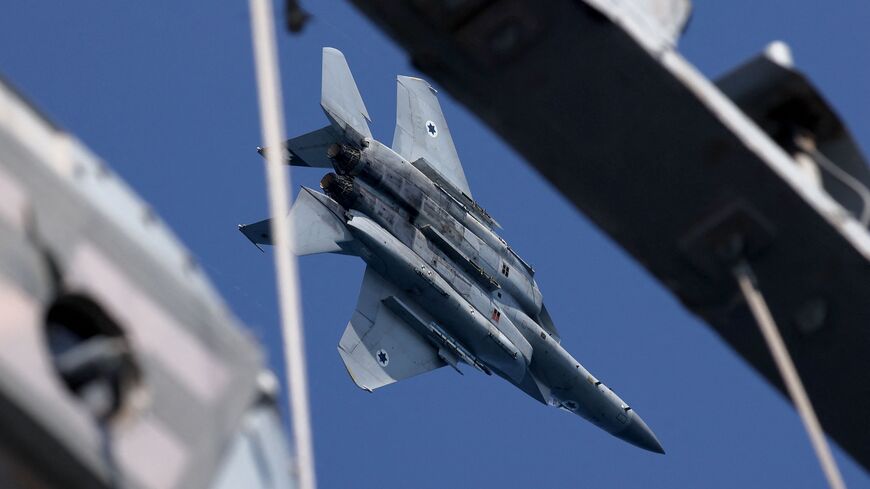WASHINGTON — The United States and Israel on Sunday kicked off the second iteration of a new series of war games designed to enable the Israeli air force to partake in long-range strikes on strategic targets hundreds of miles away from the country’s own airspace.
The latest Juniper Oak exercise began in Israel on Sunday with the participation of US F-16s, a KC-10 and a KC-46 tanker aircraft to support mid-air refueling, according to the Pentagon’s Middle East regional command headquarters.
“The exercise will incorporate a number of scenarios, including long-range strategic striking, the achievement of aerial superiority in the region and cyber defense in the face of a variety of threats,” the Israeli military said in a press release on Monday.
The five-day event will include “bilateral cyber incident response” and “agile combat employment (offensive air [exercises]) within Israel,” the US Central Command (CENTCOM) said in a separate press release.
Juniper Oak “demonstrates the US commitment to Israel’s defense and enhances military readiness of the two partners,” CENTCOM said.
Why it matters: The Pentagon and the Israel Defense Forces' announcements do not specifically mention Iran, but the second iteration of these joint US-Israeli war games within six months suggests the Biden administration is seeking to underscore its warnings to Tehran against further nuclear enrichment.
Iran accelerated its uranium enrichment after the Trump administration abandoned the 2015 nuclear accord in 2018, and the Biden administration’s efforts to return to the deal have thus far come up short.
Israel’s air force is widely believed to lack the munitions and aircraft required to carry out long-range strikes that would sufficiently damage Iran’s underground nuclear facilities to set back its nuclear program.
Such an operation would also require significant air-to-ground and air-to-air combat against Iranian pilots and air defenses to achieve superiority over Iranian skies before even reaching the targets, former senior US officials familiar with the planning have told Al-Monitor.
Israeli officials have petitioned US counterparts over multiple administrations to help them build their own military capability to mount such an operation, but bureaucratic hurdles — such as Israel’s erstwhile inclusion under US European Command’s area of responsibility — and concerns in Washington about the outcome of unilateral Israeli strikes have inhibited cooperation.
Israel was incorporated into CENTCOM’s geographic area of responsibility in 2021 amid the Trump administration’s efforts to push Arab states to normalize ties with Israel.
In January, the IDF and CENTCOM kicked off the first iteration of Juniper Oak. It was the largest combined military exercise ever held by the two countries and focused on long-range strikes on strategic targets by US B-52 bombers escorted by fighter jets from both countries launched from a US aircraft carrier in the Mediterranean Sea.
“These exercises test our forces’ interoperability in multiple domains to bolster the kinds of firm partnership we will lean on in times of crisis,” US CENTCOM commander Gen. Michael “Erik” Kurilla said Monday.
Sending a signal. The second iteration of Juniper Oak follows reports that the Biden administration has reached out to Iranian officials to negotiate a lesser, informal deal in lieu of a mutual return to the 2015 JCPOA.
The new proposal would reportedly include a halt to Iran’s further enrichment and dilution of its stockpiles of 60% enriched uranium, a cessation of attacks on US forces in the region and the release of three American citizens held in Iran.
“We have been clear to Iran that it can never be permitted to obtain a nuclear weapon,” US national security adviser Jake Sullivan said in May.
“As President Biden has repeatedly affirmed, he will take the actions necessary to stand by this statement, including by recognizing Israel’s freedom of action,” Sullivan said.
Yes, but … Iran is not pursuing a nuclear weapon at this time, a report released by the office of the US director of national intelligence on Monday concluded.
In March, the Pentagon’s top general, Mark Milley, told House lawmakers that Iran could produce enough uranium to produce a nuclear weapon within two weeks if Iran’s leaders ordered such a decision, but that it would take several more months for Iran to develop a weapon to carry the fissile material.
Keeping them close: The Biden administration is treading a fine line with Netanyahu’s far-right coalition. On the one hand, the United States has been warning Israeli leaders of the dangers of its policies toward the Palestinians; on the other hand, it is vowing to support it militarily vis-a-vis Iran and its networks of proxy militias amid concerns about a potential multifront conflict with Israel.
Axios reported in May that top Pentagon officials had offered Israeli counterparts the option to participate in shaping shared operational plans for potential future strikes against Iran, leading to skepticism among Israeli leadership.
“I’ve never seen an administration that wants Israel to be successful against Iran in doing this alone,” a former senior US official with responsibility in the region told Al-Monitor.
“The reason is because we'd rather control that. We know it's hard [to destroy Iran’s nuclear sites], and we know it won't be complete” if Israel tries to do so without US military support, the former official said.
Even if such an operation were successful, it would risk triggering Iranian retaliation against neighboring countries aligned with the US, according to Al-Monitor's sources.
If unsuccessful, it could convince Iran's leaders to accelerate steps towards building a nuclear weapon, analysts and former US officials have said.
What’s next: Israel's receipt of Boeing’s KC-46A refueling tanker isn’t expected until at least 2025.








